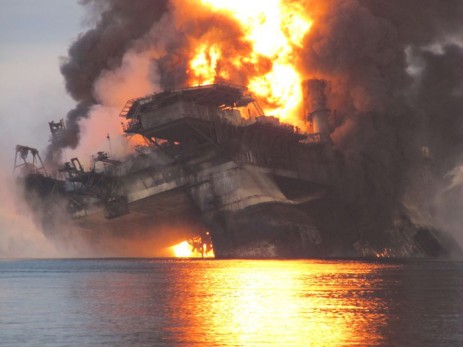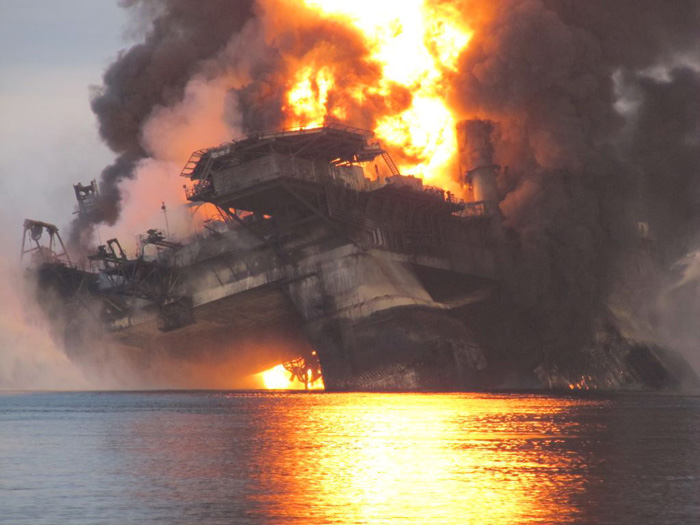 Reports from the latest investigation of the Gulf oil spill say that Halliburton and BP knew the cement used on the doomed well was “unstable.” Not saying that BP hasn’t deserved the beatdown it’s been taking for the Gulf oil spill. But now it looks like Halliburton, Dick Cheney’s old stomping grounds, has moved dead center into the line of fire.
Reports from the latest investigation of the Gulf oil spill say that Halliburton and BP knew the cement used on the doomed well was “unstable.” Not saying that BP hasn’t deserved the beatdown it’s been taking for the Gulf oil spill. But now it looks like Halliburton, Dick Cheney’s old stomping grounds, has moved dead center into the line of fire.
It’s a shame they didn’t make that right: Turns out, according to the lead investigator for the presidential commission investigating the Gulf spill, that both Halliburton and BP knew that the cement used to seal the doomed well was flawed, but neither did anything about it. Three out of four tests by Halliburton before the explosion showed the cement mixture it used was “unstable.”
During earlier rounds of finger-pointing, BP blamed bad cement work by Halliburton for the disaster. Halliburton, in turn, groused about BP’s well design. This latest twist hardly absolves BP of blame — most experts believe a series of human errors and mechanical failures was responsible — but it definitely lays more liability at Halliburton’s feet. It’s investors certainly think so — yesterday, the value of Halliburton’s stock plunged 8 percent. [Wall Street Journal]
Here’s the take of an investment banker quoted in today’s The New York Times:
Halliburton has a history of walking on the energy high beam without a net. Because they have been very aggressive, working on very high-profile types of projects, when anything goes wrong, they will be front and center.
Halliburton has issued a press release saying more analysis of the allegedly flawed cement is needed. So it goes.
And in other green news:
Listen to the profits: It’s not all bad news in the energy biz. ExxonMobil and Shell are helping us keep things in perspective by reporting 3rd quarter profits of $7.35 billion and $3.46 billion respectively. [AP]
You gotta play to spin: Before last summer’s oil spill, Nalco, the Illinois company that produces the dispersant Corexit, wasn’t a particularly big player in Washington. It spent only $90,000 for lobbying in 2009 and not a nickel in 2008. So far this year, it’s shelled out almost $350,000. [Mother Jones]
Offensive maneuvers: Corporate and industry heavy hitters — including the U.S. Chamber of Commerce, the American Petroleum Institute, the National Manufacturers Association, and the American Chemistry Council — are back on the attack against the EPA. They’ve sent a letter to key senators asking them to attach to a big upcoming spending bill, a measure that would stop the EPA from regulating greenhouse gases early next year. [The Hill]
Well, that’s that: The French Academy of Science has spoken. In a new report written by 120 scientists, it has declared that global warming exists and is unquestionably due to human activity. [AFP]
Share and share a bike: The San Francisco Bay area has come up with its own way of cutting car pollution. The plan is to have as many as 100 kiosks around the region — primarily in the neighborhoods between San Francisco and San Jose — where about 1,000 bicycles will be available to commuters looking for alternatives to driving solo. [The New York Times]
Array of hope: The pharmaceutical company GlaxoSmithKline has taken the first step to creating the largest rooftop solar array in North America. It’s installed the first of what eventually will be 11,000 solar panels on top of its distribution center in York, Pa. [Greenbiz]
Algae aweigh: A U.S. Navy gunboat took a successful test drive on a fuel that was half diesel and half a concoction made from algae. [The Guardian]
Really old navy: Looking for a different way to help deal with climate change? Britain’s Meteorological Office and the University of Oxford have rolled out a project called Oldweather.org and they need people to pore over old British Royal Navy logbooks and copy the wind, barometric pressure, and temperature readings naval officers meticulously recorded, even in the middle of battles. Your work will be fed into computer models analyzing climate change. And you’ll know so much more about barometric pressure hundreds of years ago. [Discovery News]


